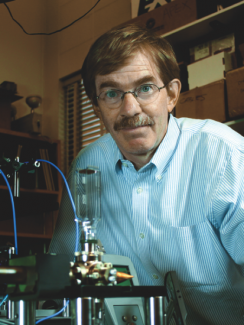In October, JILA Fellow Dana Anderson, who is also co-founder and chief technology officer at ColdQuanta, a company dedicated to commercializing quantum atomics, introduced “Albert”—nickname for ColdQuanta’s quantum-matter system on the cloud, co-developed with CU Boulder’s CUbit Quantum Initiative.
Albert allows users to remotely—and literally—cool atoms to near absolute zero to create a state of matter in which “quantum-mechanical behavior comes into play on a large scale.” Users can control, study and even photograph “the wavefunction of a quantum cloud of atoms,” allowing them to observe quantum phenomena.
That means students can now access and study quantum from wherever they are.
The full article can be found on Colorado Arts and Sciences Magazine



 The Physics Frontiers Centers (PFC) program supports university-based centers and institutes where the collective efforts of a larger group of individuals can enable transformational advances in the most promising research areas. The program is designed to foster major breakthroughs at the intellectual frontiers of physics by providing needed resources such as combinations of talents, skills, disciplines, and/or specialized infrastructure, not usually available to individual investigators or small groups, in an environment in which the collective efforts of the larger group can be shown to be seminal to promoting significant progress in the science and the education of students. PFCs also include creative, substantive activities aimed at enhancing education, broadening participation of traditionally underrepresented groups, and outreach to the scientific community and general public.
The Physics Frontiers Centers (PFC) program supports university-based centers and institutes where the collective efforts of a larger group of individuals can enable transformational advances in the most promising research areas. The program is designed to foster major breakthroughs at the intellectual frontiers of physics by providing needed resources such as combinations of talents, skills, disciplines, and/or specialized infrastructure, not usually available to individual investigators or small groups, in an environment in which the collective efforts of the larger group can be shown to be seminal to promoting significant progress in the science and the education of students. PFCs also include creative, substantive activities aimed at enhancing education, broadening participation of traditionally underrepresented groups, and outreach to the scientific community and general public.